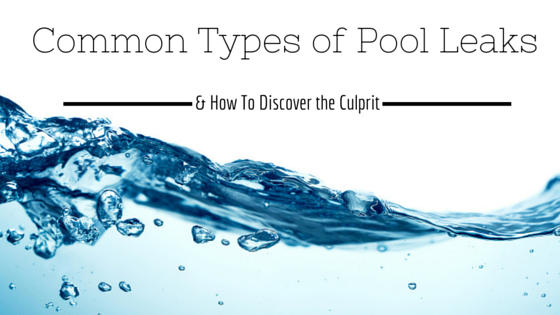
There are many sources for a swimming pool leak and homeowners should continue check pools on a regular basis. Three major causes of pool leaks are:
Finding and fixing the hot tub or swimming pool leak immediately will prevent major complications.
The three types of pool surfaces are gunite, fiberglass and vinyl. All of these surfaces are subject to cracks and tears but vinyl is the most susceptible.
Many vinyl pools are above the ground in frames. Many are surrounded by decking. Both in-ground and above ground pools can have torn liners. Pool owners must be very careful not to allow sharp objects near the vinyl. This includes pool toys, metal, plastic and glass objects.
A torn piece of vinyl can grow quickly and become a major problem by allowing dirt and other substances into the pool. The easiest way to find a tear is to check the lining on all parts of the pool. Repair kits are available to fix small tears quickly.
Fiberglass and gunite pools are more durable and they may last for many years without structural problems. Gunite is a sand and concrete mixture sprayed over rebar that has been popular for decades. Fiberglass can be used for in-ground or above ground pools.
Age may cause the treated surface in gunite pools to wear down. Loose tiles can also create cracks in the structure. Any crack or fissure should be repaired immediately to keep water from seeping into the ground and causing more problems. A leak extending into the surrounding ground can cause dirt to seep into the pool.
Check the surface of your pool for loose tiles and possible cracks. Fiberglass pools may have a spider web crack that started small and spread quickly. This also applies to above-ground fiberglass pools and hot tubs.
Loose connections at railings and light niches can cause minor leaks that could grow. These are simple structural swimming pool leaks that can be fixed immediately.
A pool pump system that does not work properly can have a leak. Water on the floor of the pump area is an indication of a leak in the system. This may indicate a shaft seal leak where the motor meets the pump. The motor has to stay dry. The seal isolates the motor from the impeller and the wet components. A new impeller or shaft seal may be necessary.
Your plumbing system may have a leak in a pipe. Newer pools using PVC piping can experience this problem if there is a crack or break in the tube. Underground cracks in the pipes can cause dirt to seep into the pool. The leak can erode concrete decking and flood nearby landscaping. Excessive water around the landscape and deck can be an indication of a leak that must be fixed immediately.
Aquaman Leak Detection can find underground leaks using modern sound equipment. Your decking does not need to be torn up to locate the leaking pipe. Aquaman will fix structural problems and check your pump system as well.
Contact Aquaman for emergencies or if you would like a quote on repairing a swimming pool leak. We serve are headquartered in Brevard County and service all of Florida.

With over 20 years of reputable experience finding leaks, owner Lowell Ball created a unique and patented leak detection system that accurately finds leaks without damaging property. We are so confident in our system and our workmanship, we offer the strongest warranty in the industry.
Aquaman Leak Detection Corporate
1275 South Patrick Dr, Suite A6
Satellite Beach, FL 32937
Owner Direct: 321.431.4784
844.766.5532 (844 POOL LEAK)
info@aquamanleakdetection.com
Office Hours:
9AM-6PM Mon-Fri
Emergency Service Available 24/7
Blog Comments